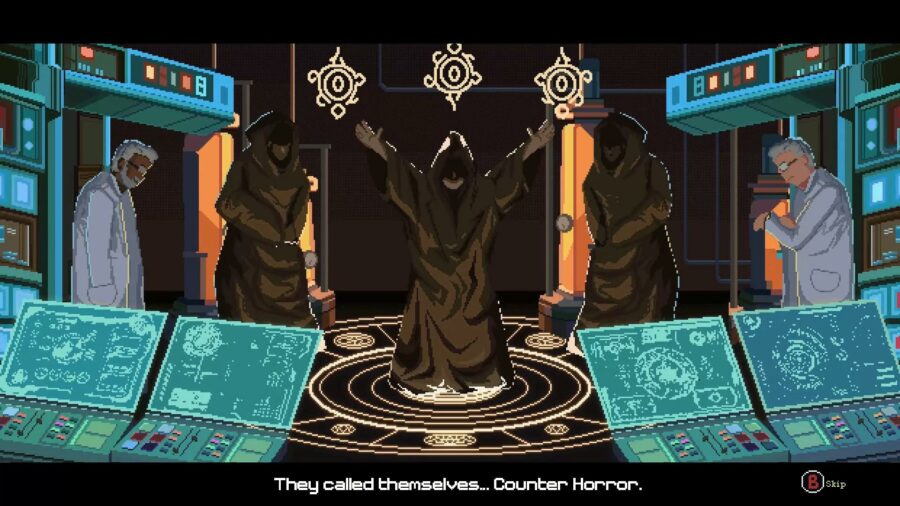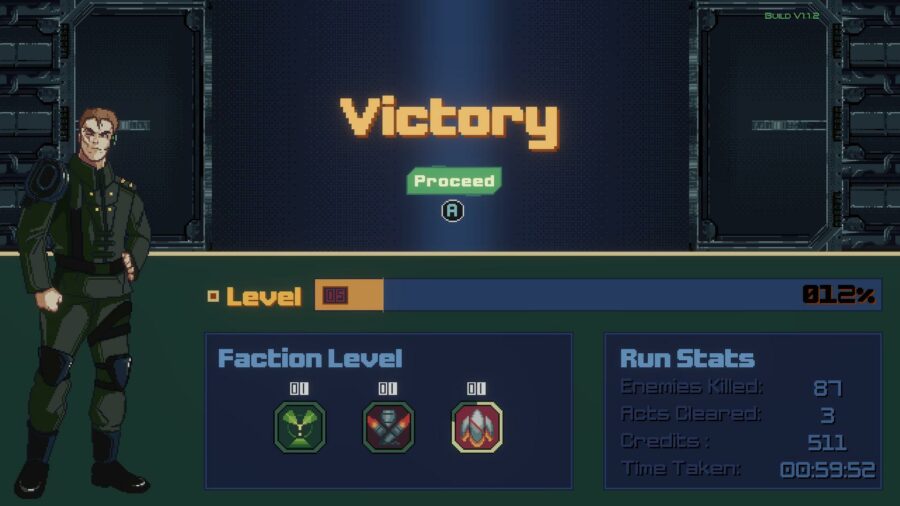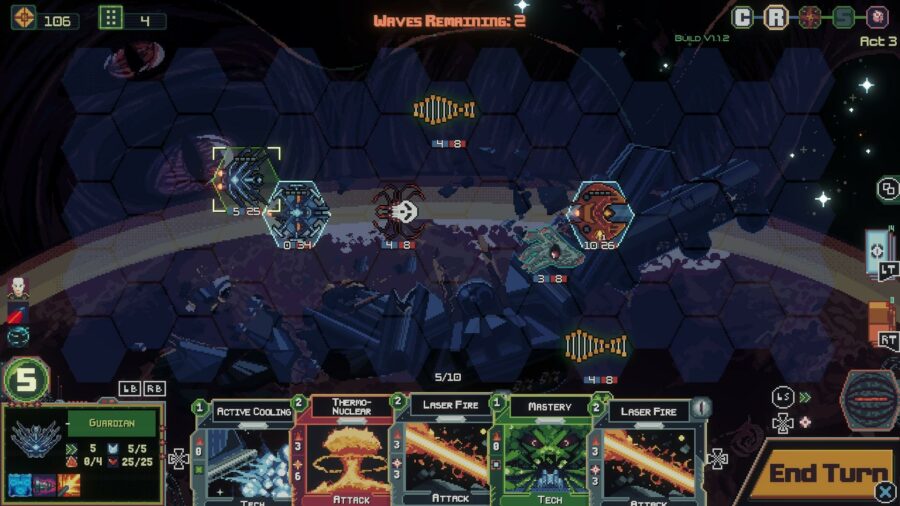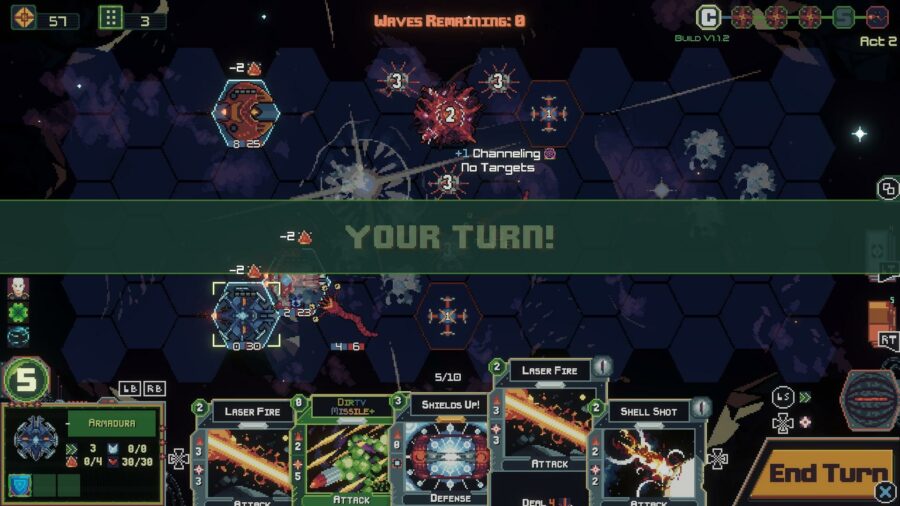Sometimes the games I pick for this column end up having more thematic resonance than I anticipated. This was the perfect week to play something in which I drop a nuclear bomb on multiple unspeakable evils. It was relaxing. Hopeful, in its way.
Starless Abyss is the kind of indie game that, when described, sounds like I made it up as a joke. It’s a pixel-art, cosmic horror, space opera, time-traveling roguelike turn-based strategy deckbuilder with Citizen Sleeper-style dice hoarding. If it had romance options and a dodge roll, Starless Abyss would be the official king of the Steam algorithm.
That paragraph makes it sound like Starless Abyss is a pile of mismatched genre tags posing as a game, but its mechanics eventually click together. The first few minutes did make me feel like I was going crazy, though, which I choose to believe was deliberate.
In the far future, humanity’s attempts to expand into space have drawn the attention of the hostile Outer Gods. Now under attack, mankind has abandoned its few offworld colonies and retreated to Earth. This has only delayed the inevitable. Humanity is doomed. It’s just a question of when the hammer will fall.

The last hope for humanity is a group that has mixed occult research with high technology and terrible personal branding. As a dubiously willing operative of “Counter Horror,” you’ve been given an experimental starship and a mission: to destroy the Outer Gods before they reach Earth.
If you’ve been playing any of the indie deckbuilders that have cropped up in the last few years, owing largely to the success of Slay the Spire, some of those skills will transfer to Starless Abyss.
At the start of a new run, you’re given a captain with some unique passive skills, at least one ship, and a small deck of basic attack and defense cards. Your goal is to make it through 3 Acts, fighting a different Outer God at the end of each one, without getting ground to mucilage by a gauntlet of space demons.

Each individual victory rewards you with extra resources, at least one new card, and a number of other potential bonuses, including a collection of dice that you can spend to positively influence certain random encounters. However, your ability to repair your ships mid-Act is deliberately limited, so a narrow victory is almost as bad as an outright defeat.
On top of that, Starless Abyss also requires you to juggle your starships’ individual overheating, which builds with every offensive card you play; keep track of movement, positioning, and lines of sight on a small hex-based grid; and track down powerful Ritual cards that only work once, but provide a game-changing benefit in exchange for a horrible penalty. If other indie deckbuilders are all simple-to-learn, hard-to-master collectible card games, Starless Abyss is one of those enormous board games with cards, dice, and a tiled map where a “simple rules explanation” takes an hour.
In practice, my most successful runs through Starless Abyss have been more about space control than anything else. Minefields and defensive turrets are worth their weight in gold, especially as you reach Act 3 and direct damage rapidly goes out of style. It’s tempting to try to build towards a burst deck where you turn anything that looks at you funny into a cloud of radioactive snot, but my first victory ended up revolving around passive damage and teleportation strategies.

Your mileage may vary, of course. The problem with evaluating games like Starless Abyss is that it takes about 40 hours of play before I can tell whether a problem I’m having is due to my inexperience or is a genuine mechanical flaw.
As an entry-level player, I do feel confident in saying that Starless Abyss is sadistic even by the standards of the genre. It gives you a two- or three-level grace period, but then it starts to hit you with attacks that teleport your ships away from one another or bypass your shields, waves of infinite reinforcements, or bosses that force you to spend your full turn to interrupt their next action. I did manage to secure a win early on, which surprised me, but it turns out your starting captain also has the easiest victory conditions. Every other character is playing a different, much harder game.
Starless Abyss isn’t going to appeal to everyone. It’s a deckbuilder aimed at people who’ve gotten tired of playing other deckbuilders on their hardest difficulty setting. If that doesn’t scare you off, or if you like the idea of a game where the goal is to find Cthulhu and shove a missile through his eye socket, Abyss has enough tactical depth and flexibility to keep you occupied for a few dozen hours. Just go into it expecting some pain.
[Starless Abyss, developed by Konafa Games and published by No More Robots, is now available for PC via Steam for $19.99. This column was written using a code for the game purchased by Hard Drive.]



